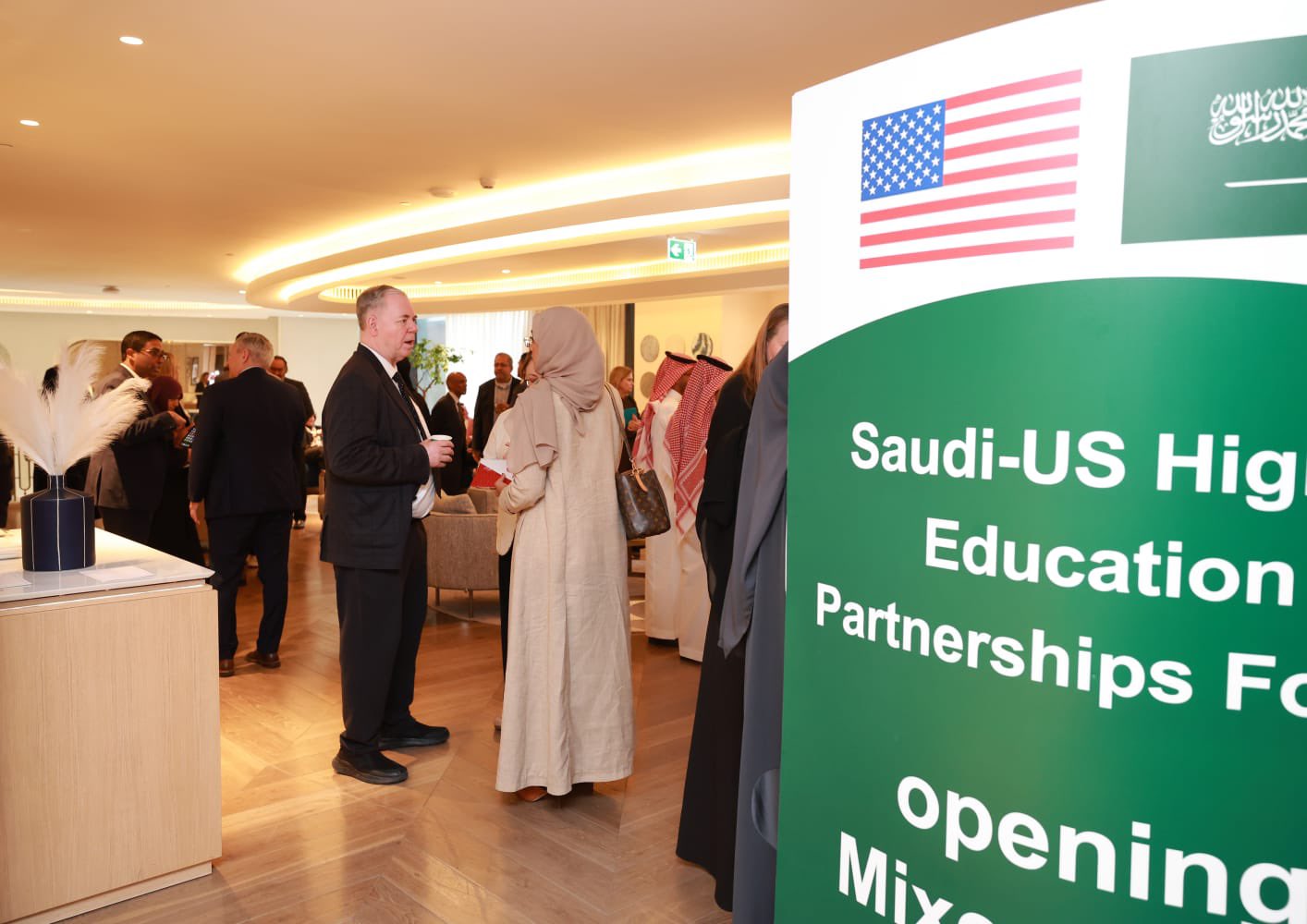Riyadh, Saudi Arabia – Minister of Education Yousef bin Abdullah Al-Benyan alongside U.S. Ambassador to Saudi Arabia Michael Ratney, on Wednesday launched the Saudi-U.S. Higher Education Partnerships Forum.
Organized by the Ministry of Education in collaboration with the U.S. embassy in Saudi Arabia and the Institute of International Education (IIE), the event saw participation from senior higher-education officials from both countries, as well as leaders from over 80 Saudi and American universities, aimed at exploring and strengthening educational cooperation between the two nations.
In his opening speech, the minister of education welcomed the U.S. ambassador to Saudi Arabia and the delegation of American universities participating in the forum, expressing his pride in the fruitful cooperation between the two countries in the field of higher education.
“The Kingdom aims to be a hub for education at both the regional and global levels. Education in the Kingdom seeks to prepare students who are capable of competing globally by building an educational system characterized by diversity and global openness,” the minister said.
He indicated that academic cooperation between the Kingdom and the United States requires joint investment and collaborative programs, such as student and faculty exchange programs, research development, and expanding joint university programs.
Al-Benyan also emphasized that such initiatives contribute to enhancing university rankings based on the quality of students and faculty, as well as the scale of investments in research and development.
Moreover, he called for taking advantage of the “Study in KSA” platform, recently launched by the Kingdom, to attract international students to study at Saudi universities. He noted that the program has attracted over 80,000 applicants from 152 countries, reflecting the Kingdom’s commitment to attracting global talent and enhancing academic exchange.
“The Saudi-U.S. Higher Education Partnerships Forum represents a significant and historic moment to establish a comprehensive action plan that paves the way for an advanced and sustainable strategic partnership between Saudi and American universities in all academic and research fields,” the minister said.
Al-Benyan pointed out that university rankings depend on three main pillars: the quality of students and educational outcomes, the quality of faculty members, and the level of investment in research and development.
He praised the role of universities in supporting sustainable development through advanced research.
He concluded by emphasizing the importance of partnerships between the two countries to achieve the aspirations of the Saudi Vision 2030, noting the Kingdom’s readiness to support academic cooperation.
Additionally, he affirmed that the forum aims to meet the aspirations of the wise leadership in realizing the Saudi Vision 2030 and work on finding solutions to any challenges or difficulties in achieving the forum’s goals.
Meanwhile, the U.S. ambassador highlighted the longstanding historical relations between the United States and the Kingdom.
“The U.S. government reaffirms its full commitment to supporting international education and promoting international exchange and cooperation, which is of great importance to the U.S. Department of State, especially the Bureau of Educational and Cultural Affairs,” the ambassador said.
The ambassador indicated that the agreement signed today marks a historic achievement, paving the way for U.S. graduate students to study in Saudi Arabia for the first time. He also emphasized that the forum aims to strengthen bilateral relations through tangible partnerships between Saudi and U.S. higher-education institutions, benefiting both sides through student and faculty staff exchanges, as well as joint research collaboration.
Rafik Mansour, U.S. deputy assistant secretary of state for educational and cultural affairs, pointed out that there are currently around 700,000 Saudi graduates from U.S. colleges and universities, thanks to long-term scholarship programs provided by the Saudi government. He commended the Ministry of Education’s launch of the educational visa program and scholarship initiatives, which open opportunities for U.S. students to visit the Kingdom for academic degrees or exchange programs.
Ministry of Education Undersecretary for Research and Innovation Dr. Nasser bin Mohammad Al-Aqili welcomed the U.S. academic delegation to the Kingdom, highlighting the strategic importance of the partnership between the two countries in the field of education. He outlined the key objectives of the Saudi Vision 2030, particularly with regard to the education and research sectors, and the plans for education reform in Saudi Arabia under this vision.
In his speech, Al-Aqili emphasized the role of the Kingdom’s higher-education sector in attracting global universities to open branches in Saudi Arabia and welcoming international students to study at Saudi universities.
Following the discussions, the minister of education and the U.S. ambassador signed the memorandum of understanding on higher education and research cooperation between the two countries, aiming to support academic and research exchange and enhance opportunities for the mobility of students, researchers, and faculty members between both countries.
The forum included several meetings and panel discussions between university leaders and government officials from the Kingdom and the United States, which focused on supporting strategic academic cooperation between the institutions of both countries, the effectiveness of educational partnerships, the future of joint research initiatives, and the student and faculty exchange programs.
As part of the forum, the U.S. delegation of academics and university representatives visited several Saudi universities in Jeddah, Dhahran, and Riyadh, where they had first-hand knowledge of the transformation of the education sector in the Kingdom, the increasing investments in university infrastructure, and the ongoing development of Saudi universities.








